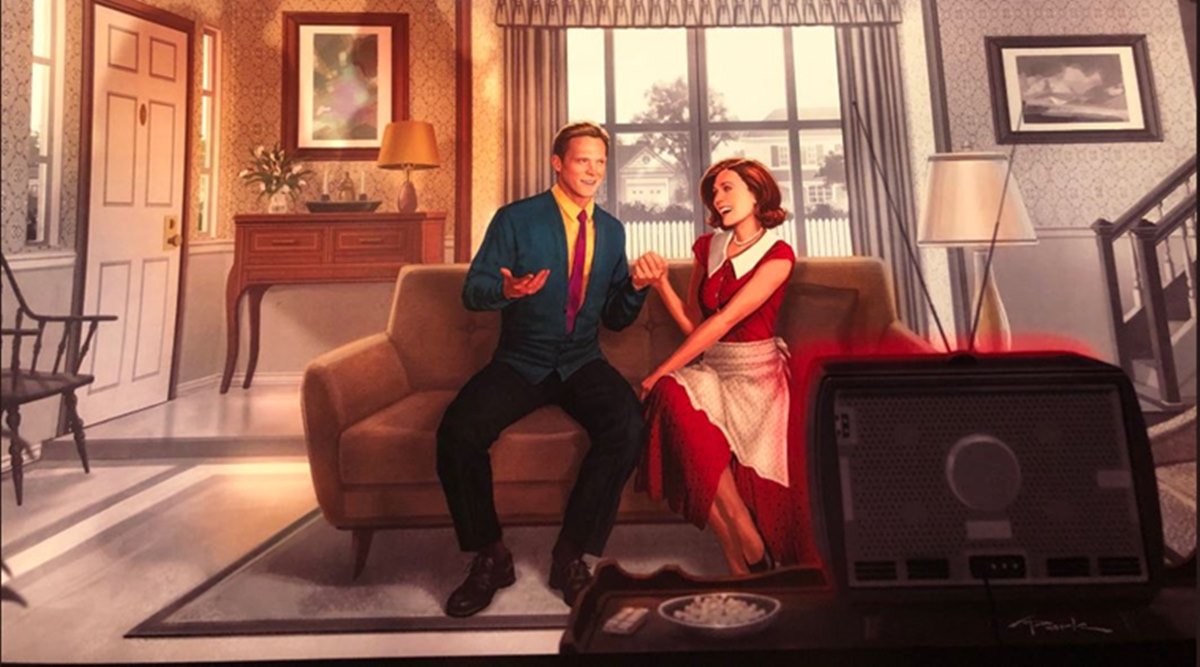WandaVision‘s Uncanny Resemblance To The Twilight Zone
"You're traveling through another dimension, a dimension not only of sight and sound but of mind..."

The first two episodes of Disney+’s WandaVision premiered last night, delivering a wacky send-up of classic 1950s and 60s sitcoms, with Wanda Maximoff (Elizabeth Olsen) and Vision (Paul Bettany) playing the role of a loveable sitcom husband and wife. The episodes clearly reference classic sitcoms like The Dick Van Dyke Show and Bewitched, but they also evoke another television classic from that era: The Twilight Zone.
Like The Twilight Zone, WandaVision presents a seemingly normal world where something is amiss. We saw Vision die in Avengers: Infinity War, a tragedy that isn’t referenced in this sitcom world. We also know instinctively something is off, thanks to a handful of disturbing scenes that break Wanda out of her reverie. She and Vision are trapped in this sitcom fantasy, but by who, and for what purpose?
The Twilight Zone often dabbled in the same themes that WandaVision explores: the multiverse, mind control, memory loss, robots disguised as humans. Much of the first two episodes center on Wanda and Vision’s attempt to prove that they are just like everyone else living on their picturesque cul-de-sac. Whether they’re hosting dinner for Vision’s boss or performing a magic act for the town’s talent show, much of the show’s conflict comes from their struggle to keep up appearances.
Season 1, episode 22 of TTZ is perhaps the most iconic of the series, “The Monsters Are Due on Maple Street”, where the residents of Maple Street start to believe an alien is living among them. The parable for Cold War paranoia is reflected in WandaVision, where Vision’s boss Mr. Hart (Fred Melamed) thinks that Wanda’s Sokovian roots makes her akin to communists. “We don’t break bread with Bolsheviks”, he sneers, before his wife (Debra Jo Rupp) shrugs off his concerns.
The second episode also features Dottie (Emma Caulfield), the queen bee of the neighborhood who doesn’t trust the new couple thanks to rumors about their uncanny abilities. “I assure you, I don’t mean anyone any harm,” Wanda says, to which Dottie responds, “I don’t believe you.” Dottie also repeatedly uses the phrase “for the children”, in reference to the talent show fundraiser. The phrase is also used in “The Monsters Are Due on Maple Street” in Rod Serling’s closing narration.
Memory loss also factors into WandaVision, as the two are unable to remember how they arrived in Westview, when they married, or anything about their former lives. Much like the season 3, episode 41 of TTZ, “Memories”, both stories revolve around people forgetting their past (or past lives) so as not to be burdened by the trauma of what they’ve endured. In both, the memory loss is a gift and a way to bury their pain and trauma.
The Twilight Zone also delves into human relationships with robots in several episodes (although Vision is clearly more than a machine). The ones most evocative here are season 1, episode 7, “The Lonely”, where a prisoner on a distant planet is given a female robot companion. Although he at first rejects the robot, he quickly falls in love with her, viewing her as a living being. Then there is season 2, episode 8 “the Lateness of the Hour”, where a young woman seeks to clear her home of robot servants, only to make a discovery that upends her very reality.
But perhaps the most sinister reference is season 3, episode 8, “It’s a Good Life”. The episode centers on Anthony Fremont, a little boy with Godlike powers who can read minds and reform reality to his liking, much like Wanda herself. The townsfolk and Anthony’s family are prisoners to his whims, as they are terrified of being wished into the cornfield. They struggle to maintain smiles on their faces, and to reassure Anthony that he is “good”.
The characters in WandaVision are similarly subject to Wanda’s desires and appear to be imprisoned in the fantasy. In a moment that illuminates the fractured reality they reside in, Mr. Hart begins choking on his food while demanding to know why Wanda and Vision moved to town. Mrs. Hart keeps repeating “stop it!”, partly to her husband and partly to Wanda, who freezes before telling Vision to help Mr. Hart.
We see Wanda control reality yet again at the end of episode 2, where she spies a masked man in a beekeeper suit crawling out of a manhole. She calmly says “No” before rewinding to a previous happier scene where she discovers she’s pregnant. It’s unclear how much of their reality is controlled by Wanda, and how much (if any) is controlled by a malevolent outside force. But clearly she has the ability to shape this reality how she wants, with zero desire to leave it.
Is Wanda a prisoner to her own fantasy or the warden? Or is there a larger malevolent force pulling the strings? We’ll have to wait and see what happens. But much like The Twilight Zone, it is sure to be some combination of the disturbing and the unusual.
(featured image: Disney+)
Want more stories like this? Become a subscriber and support the site!
—The Mary Sue has a strict comment policy that forbids, but is not limited to, personal insults toward anyone, hate speech, and trolling.—
Have a tip we should know? tips@themarysue.com